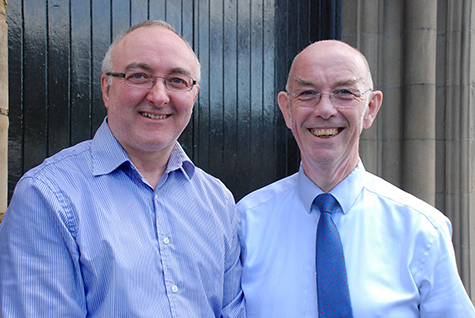Spirituality – helping the elderly overcome life’s transitions

Fri, 10 Jun 2016 09:27:00 BST
Research argue that Spirituality can help bring balance to ageing and the dramatic changes it can bring
 ◄ Professor Stephen Curran (left) and Professor John Wattis (right)
◄ Professor Stephen Curran (left) and Professor John Wattis (right)
OLD age can be a challenge, confronting people with profound changes that include the loss of loved ones, failing health and the looming end of their own lives. Can the experience be eased by mental health practitioners who use therapeutic techniques associated with “spirituality”? The issue is explored by two University of Huddersfield experts in a contribution to a new publication from the Royal College of Psychiatrists. They include case studies drawn from real life that range from the uplifting to the sad and poignant.
The book is titled Spirituality and Narrative in Psychiatric Practice, and the chapter Spirituality and Ageing is written by John Wattis, who is the University’s Professor of Psychiatry for Older Adults; with Professor Stephen Curran, who heads its Ageing and Mental Health Research Group.
The University of Huddersfield has a long-established Spirituality Special Interest Group, based in the School of Human and Heath Sciences. In their new chapter, the two professors – members of the group – analyse varied interpretations of spirituality, including the secular meaning of the term and its relevance to holistic healthcare.
“Whether sacred or secular, spirituality has profound significance for clinical practice,” they state.
The two authors also stress the importance of narrative – listening to patients telling their stories – as a component of care. They tell how they advise students dealing with a “difficult” psychiatric patient to set aside medical history and “simply listen empathetically to the patient telling their story”.
 “This is a skill which is often acquired only after years of practice,” they add.
“This is a skill which is often acquired only after years of practice,” they add.
Professors Wattis and Curran summarise the theory behind spirituality and narrative practice and they focus on the psychiatric issues associated with ageing.
“Old age requires the individual to adapt to a number of transitions, not all of which should be classes as losses,” they write, citing positive experiences such as grandchildren. Retirement can be part loss, part gain – loss of income and status, but also more time to spend on enjoyable pursuits.
On the pure loss side of the equation, bereavement becomes much more common, alongside declines in physical fitness and health, including fears of dementia and the biggest loss of all, the loss of one’s own life.
After discussing the theoretical background and stressing that “in mental healthcare we must always seek to understand and support each individual’s own unique mindset”, the professors then provide fictionalised narratives drawn from real life encounters that they and other members of the University of Huddersfield’s Spirituality Special Interest Group have had with older patients.
 They include the story of a widow coping with the effects of a stroke. She was aided by a spiritually-aware practitioner to develop resilience “in the face of the disintegrating pressures of personal loss and illness”.
They include the story of a widow coping with the effects of a stroke. She was aided by a spiritually-aware practitioner to develop resilience “in the face of the disintegrating pressures of personal loss and illness”.
There is also the story of a 73-year-old woman who had been the carer for her 94-year-old mother, who had now died, leaving her daughter angry and anxious. A nurse practitioner heard her story and guided her towards rewarding new activities and associations.
One of the case studies tells of a woman learning to cope with her husband’s dementia; another is the narrative of a 65-year-old man coping with loss and poverty in Pakistan. There is also the story of a retired fireman who, unable to cope with retirement, separation from his wife and an enforced house move, eventually committed suicide, despite an apparent improvement in his outlook. The mental health nurse who had dealt with his case was left asking if more could have been done.
In their conclusion to the chapter, Professors Wattis and Curran welcome the growing attention being paid to the spiritual challenges of old age.
“We hope the narratives about older adults and how they cope with loss will contribute to an enhanced understanding of how mental health professionals can work together to support them in a spiritually competent way in this essentially spiritual task.”







